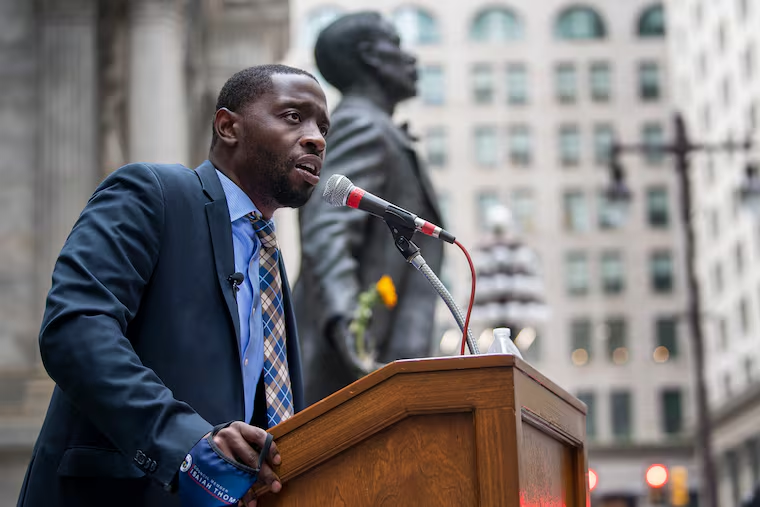Philly City Council bill aims to curb police stops of Black drivers for minor infractions
It’s a novel and, potentially, controversial approach to reducing racial bias in policing. The bill could eliminate as many as 300,000 police encounters each year.

As a young Black man driving around Philadelphia, Isaiah Thomas was repeatedly pulled over by police for no good reason. Once, he said, he was stopped for a broken taillight that — his mechanic later assured him — was a convenient fiction.
Statistically, it was bound to happen in a city where Black people make up 43% of the population but account for around 72% of vehicle stops, an analysis of police data by the Defender Association of Philadelphia found.
Now, as an at-large City Council member, Thomas aims to change that. Along with nine cosponsors, he plans to introduce legislation Thursday that would ban police stops for motor-vehicle code violations, which include minor infractions like a broken taillight, tinted windows, or failure to come to a complete stop at a stop sign. Instead, under the bill, drivers would be mailed tickets or warnings for such violations.
Thomas said it’s a way to ensure equitable treatment of drivers. “We may not be able to change the hearts and minds of every officer, but we can certainly put policies in place to protect people in the city,” he said.
About 97% of police vehicle stops are for such violations rather than for criminal activity, according to the Defender Association, which has been tracking disparities in police stops. It says ending the practice could eliminate as many as 300,000 police encounters each year.
The draft legislation makes exceptions for public-safety risks and other special circumstances. The Defender Association’s analysis suggests Thomas' bill could help curb constitutional violations. Car stops are more frequent in districts with more Black residents, it noted. And, Black drivers who are stopped are twice as likely to be searched as white drivers, though those searches are 34% less likely to turn up contraband.
“This bill really represents decriminalizing minor traffic violations, and that is necessary,” said Chief Defender Keir Bradford-Grey. “We cannot ask the police to police themselves when it comes to racism.”
Still, it’s a potentially controversial approach to reducing racial bias. John McNesby, president of the Fraternal Order of Police Lodge 5, did not return a call Wednesday afternoon. A Philadelphia Police Department spokesperson declined to comment. Thomas said he had contacted the police and city administration to discuss the bill but had not yet had a substantive discussion.
Thomas and supporters said the fatal shooting of Walter Wallace Jr. by police on Monday only underscores the urgency of the measure.
“If [this] legislation had passed in 2014, perhaps Brandon Tate-Brown would still be alive,” said the Rev. Mark Tyler, an organizer with POWER, referencing a Black man who was killed by Philadelphia police during a traffic stop by police because he was driving at night with running lights but not headlights.
The reform should not impact public safety, advocates argue: Fewer than 1% of stops related to code violations turned up contraband of any sort last year.
City Council member Kendra Brooks believes it could help restore police-community relations.
“Motor-code violations contribute to the deep mistrust between police and the communities they police, especially Black communities,” Brooks said. “Driving stops make Black and brown drivers feel harassed and surveilled.”
Kalfani Ture, a professor of criminal justice at Quinnipiac University and a former police officer, called the bill an important move to institutionalize antiracist policies. He also noted that Americans of all races have objected to the privacy violation of routine vehicle stops and searches since the invention of the automobile. It’s only since the 1960s, he said, that it became normalized as an approach to policing poor, Black, urban communities.
“When I was coming through the police academy … you were put behind a vehicle and you had to find probable cause or reasonable suspicion to make a stop," Ture said.
In his view, the destruction seen alongside protests after the death of Wallace this week speaks to the distress to which current practices have contributed.
“It’s these types of stops,” he said, “that create an anger that can only be resolved through aggressive forms.”
Wallace was on foot and wielding a knife when he was fatally shot Monday in West Philadelphia by officers who had been called to his home for a disturbance, authorities and witnesses have said.